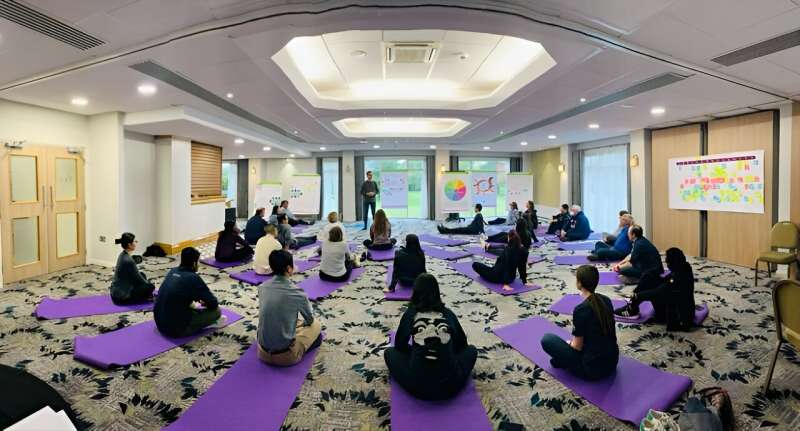
Christoph Spissens teaches a mindfulness class. Photo by Alessandro Sparacio
Mindfulness practices, which stem from ancient meditation traditions, are becoming increasingly popular in modern society. Past research has shown that these practices, which encourage people to intentionally focus their attention on the present moment, have a variety of benefits, including reducing stress, regulating emotions, and improving focus.
Researchers from the University of Grenoble Alpes, Swansea University, and other institutes around the world conducted a large-scale study aimed at further investigating the impact of mindfulness practice on stress levels. Nature Human behaviorsuggests that self-managed mindfulness practice may be beneficial in reducing self-reported stress in the short term.
“At the beginning of my doctoral program, I decided that the first logical step in gathering evidence would be to assess the quality of existing research through a meta-analysis,” Alessandro Sparacio, first author of the paper, told Medical Express. “Our goal was to determine whether the current evidence on self-managed mindfulness was sufficient. We found that existing studies were of insufficient quality and had too small sample sizes.”
In a review of previous literature focusing on self-managed mindfulness practices, Sparacio and his colleagues found that most studies had important limitations. This doesn’t necessarily mean that mindfulness interventions are ineffective, but it does reduce the certainty that they can be considered beneficial.
The researchers therefore decided to conduct a new study to address the limitations they had identified. They conducted the first study of its kind, involving a much larger number of participants recruited from various research institutions around the world.
“I was fortunate to spend the first two years of my PhD at the CORE lab in Grenoble, where my colleagues had a lot of experience in ‘large-scale team science’ projects,” Sparacio said.
“Patrick Forcher, a postdoc in our team at the time, had recently written an important theoretical paper outlining the pros and cons of large-scale team science and played a major role in launching this project. In addition, fellow PhD student Olivier Dujols had just built the research infrastructure for the STRAEQ-2 study.”
To overcome the limitations of previous studies, Sparacio relied on the support of the CORE Lab team at Université Grenoble Alpes, where he earned his PhD. He also surveyed a number of mindfulness practitioners to identify the practices that would be best suited for his research before conducting the actual experiment.
This large-scale study involved 61 researchers from various laboratories in the US, UK, Europe and Australia and was carried out at 37 locations. A total of 2,239 people took part in the study, which is an unprecedented number for a mindfulness-related study.
Because the study was conducted during the peak of the COVID-19 pandemic, participants completed mindfulness exercises online. The researchers evaluated four of the most well-known mindfulness exercises: mindful breathing, body scan, mindful walking, and loving-kindness meditation.

Mindfulness instructor Christoph Spiessens recorded the audio tracks included in the experiment. Courtesy of Christoph Spiessens.
“In the body scanning exercise, participants mentally scanned different parts of their body, refocusing on each part whenever they became distracted,” Sparacio explained.
“In mindful breathing, participants focused on their breathing without trying to change it, and gently brought their attention back to their breathing whenever they became distracted. In loving-kindness meditation, participants brought feelings of compassion to themselves and then extended those feelings to others. In mindful walking, participants walked in a quiet, distraction-free environment and focused on their physical sensations as they walked and the feeling of their feet touching the ground.”
Study participants were asked to complete a survey about their stress levels via a provided link before and after their mindfulness practice. Their responses were compared to those of a control group who listened to a randomly selected story of the same length as the practice.
“Each participant took part in a 15-minute mindfulness meditation session in their own home, which was pre-recorded by certified instructor Christoph Spiessens,” Sparacio said. “This approach allowed participants to practice mindfulness in a familiar and comfortable environment, which was especially important during the pandemic when minimizing stress was crucial.”
A larger study conducted by Sparacio and his colleagues specifically assessed the short-term effects of mindfulness exercises on stress levels by having participants share feedback immediately after the exercise. The team found that the exercises significantly reduced subjective stress levels, with most participants reporting feeling less stressed after finishing the exercise.
“This was a challenging but rewarding project, and I am extremely grateful to everyone who contributed directly and indirectly,” said Sparacio. “As a mindfulness practitioner, I was initially disappointed by the results of the meta-analysis because I was hoping for high-quality evidence supporting self-managed mindfulness. However, our multi-center study at least partially vindicated my belief that self-managed mindfulness is effective.”
Overall, the results of this multinational collaborative study suggest that self-administered mindfulness exercises can help reduce stress levels in the short term. Given the large sample size and the team’s efforts to overcome previous limitations, confidence in some of the short-term benefits of these practices may be increased.
“I was biased toward mindfulness, but one of my supervisors, Dr. Rocha Yzerman, was skeptical and made sure I provided high-quality evidence,” Sparacio said, “but he now acknowledges that the evidence we have gathered has changed his view to believe that mindfulness works.”
Although the team’s findings highlight the benefits of mindfulness, Sparacio believes people should be cautious about using the findings to make practical suggestions, as some of the limitations of mindfulness research remain to be addressed.
“Although this study provides the best evidence to date, there are still limitations that need to be addressed,” he said.
“For example, do the effects also apply to people with low incomes? Are the observed effects not simply due to an ‘expectancy effect’? How do different personality types affect the effects? What happens if you engage with mindfulness over the long term? In summary, we can assume that self-managed mindfulness is generally effective, but people who want to incorporate mindfulness into their lives should do so with caution and with these questions in mind.”
Sparacio and his colleagues in Singapore are now planning a multi-site follow-up project focusing on self-administered mindfulness exercises, which may include the 17 sites where the original study took place, to overcome further experimental limitations and potentially assess longer-term physiological effects.
For more information:
Alessandro Sparacio et al. “Self-administered mindfulness intervention reduces stress in a large randomized controlled multicenter study” Nature Human behavior (2024). Publication date: 10.1038/s41562-024-01907-7
© 2024 Science X Network
Quote: Large-scale study assesses short-term impact of self-administered mindfulness exercises on stress (June 25, 2024) Retrieved June 25, 2024 from https://medicalxpress.com/news/2024-06-large-scale-short-term-impact.html
This document is subject to copyright. It may not be reproduced without written permission, except for fair dealing for the purposes of personal study or research. The content is provided for informational purposes only.

